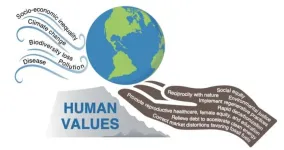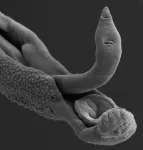(Press-News.org) Novel approach finds gut microbiota that are highly predictive of BMI, waist circumference, and fat mass are different in men and women
And might change the chemical makeup (metabolome) of the gut in ways that affect the metabolism of different bioactive molecules that influence metabolic disease development
Interventions to help prevent obesity-favourable microbiome may need to be different in men and women
*This is an early press release from the European Congress on Obesity (ECO 2024) Venice 12-15 May. Please credit the Congress if using this material*
New research being presented at this year’s European Congress on Obesity (ECO) in Venice, Italy (12-15 May) identifies changes in the composition of gut bacteria that may play a key role in the onset and development of obesity, with differences in men and women, which might affect the metabolism of different nutrients and therefore the presence of bioactive molecules in the gut that influence the development of metabolic disease.
The gut microbiota consists of a complex community of microorganisms (bacteria, viruses, fungi and protozoa) which inhabit the gastrointestinal tract. Disruption in this community (dysbiosis) significantly affects metabolic health and influences the risk of certain diseases, including obesity. However, it is still unclear which species represent a greater or lesser likelihood of developing obesity, as well as the impact of these species on our metabolic health.
To find out more, researchers analysed metagenomic and metabolomic data from a Spanish population to understand the mechanisms by which these microorganisms are involved in the development of obesity.
They examined the faecal metabolome—the diverse collection of metabolites (small molecules) found in the gut and shed in faeces that are produced by gut bacteria as a byproduct of metabolising food and make their way into the bloodstream impacting health.
Overall, 361 adult volunteers (251 women/110 men, average (median age 44 years old) were included from the Spanish Obekit study—a randomised trial examining the relationship between genetic variants and the response to a hypocaloric diet.
All participants (65 normal-weight, 110 overweight, and 186 with obesity) were classified according to an obesity (OB) index—LOW (BMI≤ 30 kg/m²; fat mass percentage ≤ 25% [women] or ≤ 32% [men]; waist circumference ≤88 cm [women] or ≤ 102 cm [men]) or HIGH (BMI > 30 kg/m²; fat mass >25% [women] or >32% [men]; waist circumference >88 cm [women] or >102 cm [men]) level of obesity.
Researchers made sure that participants in the LOW and HIGH groups were matched for sex and age.
Genetic microbiota profiling was done to identify the different types, composition, diversity, and relative abundance of bacteria present in stool samples of the participants.
The analysis revealed that individuals with a HIGH OB index were characterised by significantly lower levels of Christensenella minuta—a bacterium which has consistently been linked to leanness and health.
In men, greater abundance of Parabacteroides helcogenes and Campylobacter canadensis species—were strongly associated with higher BMI, fat mass, and waist circumference.
Whereas in women, greater abundance of three species—Prevotella micans, Prevotella brevis and Prevotella sacharolitica—were highly predictive of higher BMI, fat mass and waist circumference, but not in men.
In further untargeted metabolomics analyses, that looked at a broader range of metabolic compounds in the blood, researchers found variation in the abundance of certain metabolites—especially higher levels of bioactive lipids—phospholipids (implicated in the development of metabolic disease and critical modulators of insulin sensitivity) and sphingolipids (that play a role in the development of diabetes and the emergence of vascular complications)—in participants with a HIGH OB index.
“Our findings reveal how an imbalance in distinct bacterial groups are likely to play an important role in the onset and development of obesity, with considerable differences between the sexes, which might affect the metabolism of different bioactive molecules present in the metabolome that influence the development of metabolic disease”, says lead author Dr Paula Aranaz from the Centre for Nutrition Research at the University of Navarra in Spain.
She adds, “Gut microbiome composition, specifically higher levels of the Christensenella minuta bacterium, appeared to protect against obesity. Whereas the species that influence the risk of developing obesity appear to be different between the sexes and interventions to help prevent an obesity-favourable microbiome may need to be different in men and women. Further research is needed to better understand when the switch to an obesity favourable gut microbiota may take place, and therefore the right timing for possible interventions.”
She concludes, “We hope that this study demonstrates that using metagenomics in combination with metabolomics enables researchers to study the mechanisms involved in the development of metabolic diseases such as obesity with a high degree of confidence. This novel, broader approach could help to develop nutritional precision strategies for weight loss that modify the presence of specific bacteria strains, or the levels of bioactive molecules.”
Despite the important findings, the authors note some limitations, including the small sample size (especially for men) and that the study was conducted in one area in Spain, and because climate, geography, diet, and culture are known to influence the gut microbiome, the findings might be not generalisable to other populations.
END
Gut bacteria that strongly influence obesity are different in men and women, study finds
Novel approach finds gut microbiota that are highly predictive of BMI, waist circumference, and fat mass are different in men and women
2024-04-03
ELSE PRESS RELEASES FROM THIS DATE:
Double trouble: the risks of mixing alcohol and sports wagering
2024-04-02
It turns out that money isn’t the only thing sports gamblers are risking. According to a new study, bettors who wager on sporting events, esports, and daily fantasy sports are much more likely than other individuals to binge drink.
The findings, compiled by a research team from UNLV and the University of New Mexico, were published this week in the journal JAMA Network Open.
Over the course of three weeks in spring 2022, researchers surveyed more than 4,300 adults across the U.S. Nearly 3,300 self-reported past year alcohol use, while about 1,800 identified themselves as gamblers who had bet on sports in the past year.
Researchers ...
Far-UVC light can virtually eliminate airborne virus in an occupied room
2024-04-02
NEW YORK, NY--Far-UVC light is a promising new technology for reducing airborne virus levels in occupied indoor spaces, but its effectiveness has not been evaluated in real-life scenarios.
A new study by Columbia researchers now shows that far-UVC light inactivated nearly all (>99%) of an airborne virus in an occupied work environment, showing that the technology can work as well in a real-life scenario as in the laboratory.
“The results show that far-UVC is highly effective at reducing airborne pathogens in an ordinary occupied room, and so it’s practical to use far-UVC light in indoor areas where people are going about their business,” says David ...
A new estimate of U.S. soil organic carbon to improve Earth system models
2024-04-02
Soil contains about twice as much carbon as the atmosphere and plants combined. It is a major carbon sink, capable of absorbing more carbon dioxide from the atmosphere than it releases. Management of soil carbon is key in efforts to mitigate climate change, in addition to being vital to soil health and agricultural productivity.
Measuring soil carbon, however, is a painstaking, expensive process. Samples must be dug from the ground and sent to a lab for analysis, making upscaling measurements on a large spatial scale ...
Scientists’ urgent call: end destruction and forge a just, sustainable future
2024-04-02
An international team of scientists published a study today in the Proceedings of the National Academy of Sciences NEXUS emphasizing the urgent need to align political will, economic resources, and societal values to ensure a more sustainable and equitable world. Led by University of Hawai‘i at Mānoa researchers, the 18 authors combine their expertise in earth and ocean sciences, politics, law, public health, renewable energy, geography, communications, and ethnic studies to assess causes, impacts, and solutions to a multitude of worldwide crises.
“Climate change, ecological destruction, disease, pollution, and socio-economic inequality ...
First results from BREAD experiment demonstrate a new approach to searching for dark matter
2024-04-02
One of the great mysteries of modern science is dark matter. We know dark matter exists thanks to its effects on other objects in the cosmos, but we have never been able to directly see it. And it’s no minor thing—currently, scientists think it makes up about 85% of all the mass in the universe.
A new experiment by a collaboration led by the University of Chicago and Fermi National Accelerator Laboratory, known as the Broadband Reflector Experiment for Axion Detection or BREAD, has released its first results in the search for dark matter in a ...
Focusing ultra-intense lasers to a single wavelength
2024-04-02
Ultra-intense ultrashort lasers are powerful tools used in various fields like physics, national security, industry, and healthcare. They help researchers delve into strong-field laser physics, laser-driven radiation sources, particle acceleration, and more.
“Peak power” measures the intensity of these lasers, like the Nova laser (Lawrence Livermore National Laboratory, California, USA) with 1.5 petawatts of peak power, the Shanghai Super-intense Ultrafast Laser Facility (SULF, China) with 10 petawatts, or the Extreme Light Infrastructure – Nuclear Physics (ELI-NP, Romania) with a peak ...
Combining food taxes and subsidies can lead to healthier grocery purchases for low-income households
2024-04-02
Chapel Hill, NC, April 2, 2024 — A new study that models the combined effects of a sugar-based tax on beverages and targeted subsidies for minimally processed foods and drinks found that under these policies, low-income consumers would purchase less sugar-sweetened beverages and more fruits, vegetables, and healthier drinks, particularly in households without children.
Researchers at the University of North Carolina at Chapel Hill developed a model to simulate what would happen if national-level taxes on less-healthy, ...
One in five people with cancer participate in medical research studies
2024-04-02
SEATTLE – April 2, 2024 – Researchers from Fred Hutchinson Cancer Center, the American Cancer Society Cancer Action Network and peer institutions released new findings in the Journal of Clinical Oncology showing that when all types of cancer research studies are considered, at least one in five people with cancer, or 21.9%, participate in some form of clinical research.
The study evaluated all categories of cancer studies, such as treatment trials, biorepository studies and quality of life studies—the first time an estimate of participation in all types of cancer ...
Sunrise to sunset, new window coating blocks heat — not view
2024-04-02
Windows welcome light into interior spaces, but they also bring in unwanted heat. A new window coating blocks heat-generating ultraviolet and infrared light and lets through visible light, regardless of the sun’s angle. The coating can be incorporated onto existing windows or automobiles and can reduce air-conditioning cooling costs by more than one-third in hot climates.
“The angle between the sunshine and your window is always changing,” said Tengfei Luo, the Dorini Family Professor for Energy Studies at the University of Notre ...
Innovative molecular biology technique allows for discovery of novel targets for candidate vaccines against schistosomiasis
2024-04-02
Researchers in Brazil have used an innovative technique in molecular biology to identify targets for candidate vaccines against Schistosoma mansoni, the parasite that causes schistosomiasis.
Considered one of the world’s 17 neglected tropical diseases (NTDs), schistosomiasis affects some 200 million people in 74 countries, according to the World Health Organization (WHO). Six million are estimated to be infected in Brazil, mainly in the Northeast region and Minas Gerais state.
The scientists used phage display, the study of protein interactions using bacteriophages, viruses that infect bacteria, to screen 99.6% of 119,747 DNA sequences encoding the proteins known ...
LAST 30 PRESS RELEASES:
Emerging class of antibiotics to tackle global tuberculosis crisis
Researchers create distortion-resistant energy materials to improve lithium-ion batteries
Scientists create the most detailed molecular map to date of the developing Down syndrome brain
Nutrient uptake gets to the root of roots
Aspirin not a quick fix for preventing bowel cancer
HPV vaccination provides “sustained protection” against cervical cancer
Many post-authorization studies fail to comply with public disclosure rules
GLP-1 drugs combined with healthy lifestyle habits linked with reduced cardiovascular risk among diabetes patients
Solved: New analysis of Apollo Moon samples finally settles debate about lunar magnetic field
University of Birmingham to host national computing center
Play nicely: Children who are not friends connect better through play when given a goal
Surviving the extreme temperatures of the climate crisis calls for a revolution in home and building design
The wild can be ‘death trap’ for rescued animals
New research: Nighttime road traffic noise stresses the heart and blood vessels
Meningococcal B vaccination does not reduce gonorrhoea, trial results show
AAO-HNSF awarded grant to advance age-friendly care in otolaryngology through national initiative
Eight years running: Newsweek names Mayo Clinic ‘World’s Best Hospital’
Coffee waste turned into clean air solution: researchers develop sustainable catalyst to remove toxic hydrogen sulfide
Scientists uncover how engineered biochar and microbes work together to boost plant-based cleanup of cadmium-polluted soils
Engineered biochar could unlock more effective and scalable solutions for soil and water pollution
Differing immune responses in infants may explain increased severity of RSV over SARS-CoV-2
The invisible hand of climate change: How extreme heat dictates who is born
Surprising culprit leads to chronic rejection of transplanted lungs, hearts
Study explains how ketogenic diets prevent seizures
New approach to qualifying nuclear reactor components rolling out this year
U.S. medical care is improving, but cost and health differ depending on disease
AI challenges lithography and provides solutions
Can AI make society less selfish?
UC Irvine researchers expose critical security vulnerability in autonomous drones
Changes in smoking status and their associations with risk of Parkinson’s, death
[Press-News.org] Gut bacteria that strongly influence obesity are different in men and women, study findsNovel approach finds gut microbiota that are highly predictive of BMI, waist circumference, and fat mass are different in men and women




